October 22, 2017
In advance, the following statements are not generally applicable to tea shops – whether online or physically. While it is this article’s declared goal to bring transparency into our tea retail prices, Siam Tea Shop occupies a niche of its own on the tea market. This is why my sourcing and other processes also follow their own rules. And accordingly, the nature and sequential structure of the cost centers of a tea in Siam Tee Shop differs significantly from that of most other tea shops.
For example, we import all our Thai, Chinese, Indian, Vietnamese and Laotian teas directly from their respective countries of origin. Unlike most standard western tea shops, who will source most or all their teas from a wholesaler located within their own country. It is obvious that the import and associated shipping, tax and customs clearance procedures make the sourcing of a tea a lot more complex. And with increasing complexity, the number of cost centers increases…
Nevertheless, this is actually… good. Because Siam Tee Shop wanted to be different right from the beginning. From the beginning, it was my goal to offer teas of a quality and originality level that would be truly rare in the west. And from the beginning, there was a premise that a lack of business experience and commercial talent was to be compensated by a plus of personal commitment, hard work and a genuine passion for tea.
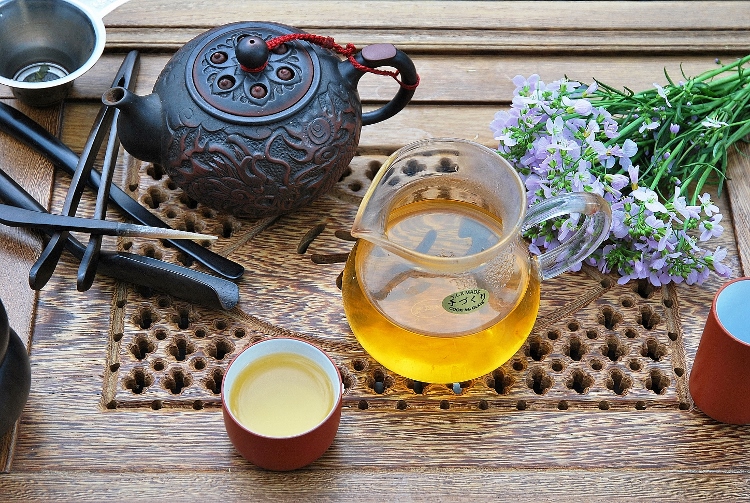 DMS Four Seasons Oolong Tea @ Siam Tea Shop
DMS Four Seasons Oolong Tea @ Siam Tea Shop
2 Examples for the calculation of tea prices at Siam Tea Shop
To make the calculation of tea prices in the Siam Tee Shop not only transparent, but also vivid, I would like to exemplify calculations on two of our teas. One example is our DMS Si Ji Chun Four Seasons Oolong Tea, which we source directly from our long-term producer partner in northern Thailand. Here, we maintain particularly good relationships, so that my purchase price is significantly below the usual market price for this level of quality. In addition, we get tea from the best batches only.
 Artisan Yunnan Golden Tips black tea @ Siam Tea Shop
Artisan Yunnan Golden Tips black tea @ Siam Tea Shop
A second example is one of our Chinese teas, Artisan Yunnan Golden Tips. Since I cannot maintain similarly close ties with producers in China, because of the geographical distance, I must resort to local wholesalers there. These must fulfill three conditions. Firstly, they must be specialized in exactly the quality and originality segment in which Siam Tee Shop wishes to operate. Secondly, they must be able to provide extensive information and background information on each of their traded teas. And thirdly, they must be able to provide serious proof of the indicated organic or EU compliance standard of a tea.
Sequential list of cost centers
To calculate Siam Tea Shop’s retail prices for the two selected teas, we now need a list of all applicable cost centers. These must be listed in their temporal / logical sequence, so that, for example, customs or tax rates can be applied to the correct amount. For this I have created the above diagram. Based on this diagram, we can now determine the costs for the two selected teas in detail. To this, we’ll have to accompany our teas all the from their producer to your home.
 Cost center sequence of our teas at Siam Tea Shop – click to enlarge
Cost center sequence of our teas at Siam Tea Shop – click to enlarge
100g DMS Four Seasons Oolong Tea – The Cost
For the sake of simplicity, we will present all costs incurred in Thai-Baht directly in Euro.
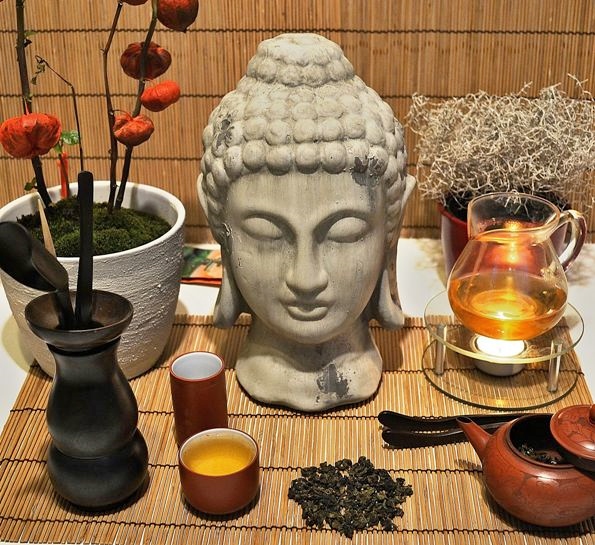 DMS Four Seasons Oolong Tea at Siam Tea Shop
DMS Four Seasons Oolong Tea at Siam Tea Shop
Purchasing price at the producer / supplier
We buy this tea at a kilo price of about 26.00 EUR, according to current exchange rate. This corresponds to a cost of EUR 2.60 / 100g. After receiving the order, our producer partner in Doi Mae Salong, North Thailand, packs the tea and takes it to the post office located in Mae Chan, North Thailand, about 37 kilometers away.
Shipping fee to Germany
There, our partner sends the tea to us via air freight at the price of approx. 15,00 Euro / kg. This is equivalent to EUR 1,50 / 100g pack.
Customs fees + import VAT + handling costs
In the EU, the import of tea is subject to an import VAT of 7% on the purchase price plus shipping charges. To this add customs fees of more than 3% on the same basic amount. Since the delivery of our Thai teas takes place via the local customs office, the handling costs are limited to my gasoline cost for the journey to our local customs office, which is 50km away. Plus, of course, my time … and nerves. Accordingly, this cost center adds up to the amount of EUR 1.10 for our 100g bag DMS Four Seasons Oolong Tea.
Storage and warehousing costs
Now, the tea is at my home and needs to be stored. Since my private rooms share a house with my rooms for tea storage and consignment – and because this house is my property – there is no storage costs in Siam Tee Shop except for the heating of the packing and consignment space as well as for the cooling of individual teas. However, DMS Four Seasons Oolong Tea doesn’t need any cooling. And the space used for packing is heated together with our living space. Therefore, I assess the storage costs of this tea with 0,00 Euro.
Operating and administrative Costs
This cost position falls out of our temporal-logical sequence. This is because it is about the basic operational costs of Siam Tea Shop, which are accruing independently of our tea’s way into your cup. Nevertheless, without them, there would be no Siam Tea Shop, so they are still an integral part of our cost structure. These include, for example, the cost of maintaining our web presences, as well as our hardware, software and web-based resources. For example, computers, internet, communication, webhosting, webmaster, fees for Microsoft Office, Adobe, and more.
Then, they also include means of operation such as precision scale, printers, paper, cartridges, office supplies of all kinds, etc. Plus, of course, the rooms that I need for the various activities. And the tax consultant, who does the annual accounts for me and Siam Tee Shop. Or, for example, the occasional quality controls of our Thai teas sourced directly from the producer, being done in a specialized private German food laboratory. And there’s more…
In total, these costs for Siam Tea Shop currently add up to approx. 6000, – Euro per year. Since Siam Tee Shop is selling about 180kg of tea each year, we have a cost rate of EUR 3.35 for our 100g bag DMS Four Seasons Oolong.
Packaging and shipping costs
First, the cost for tea bags vary depending on their type and size. So, Siam tea shop also uses different bags depending on size and type of tea. In addition, it takes a label sticker for each ordered tea. And a shipping box for each order. And then, there’s the factor work … Often enough, I don’t have the time to take care of packaging and consignment myself. Sometimes, I’m not even available on location, due to travel or other commitments. In any such cases, I must pay someone for packaging and consignment.
The “factor work” with packaging
A few words more on the factor “work” in this regard: At first, we need to select the correct bag and pick it from the shelve. Then, the container with the corresponding tea needs to be identified and pulled from the shelve. If it’s empty, we must refill it from the main storage. Then, we need to find the adhesive label of the respective tea in a dedicated physical folder, take it off, stick it on the tea bag and label it with the bag’s net weight. Only then, we fill the tea from the large container into the bag, which is placed on a precision scale for that purpose. Now, we select the proper box, fold it and place the tea bag into it, along with other teas of that order, if any, and/or filling material, where needed.
We are not finished yet, as we still have to seal the box with sealing tape. Then, we prepare the invoice for this order on the PC, print it and place it in the box. Or, for shipments to outside the EU, put it in an adhesive bag and stick the same on the outside of the box. As a last step then, we write the order details and customer’s address details on the shipping label. Only now, your order is ready for its way to the post office. And not to forget, we add a free tea sample, for which the same packaging expenditure occurs, to each order!
So, when I add the amount of EUR 3.50 to our 100g-package DMS Four Seasons Oolong as packaging costs, this is more than modest. The amount comprises of EUR 1,00 material and EUR 2,50 labor costs.
Total Cost and Profit (100g DMS Four Seasons Oolong Tea)
If we add all above-mentioned costs of a 100g-pack DMS Four Seasons Oolong, we receive total cost of more than 12.00 Euro. To determine my profit, readers might compare this result with the retail price of this tea at Siam Tea Shop… And conclude that the difference amount is hard earned small money.
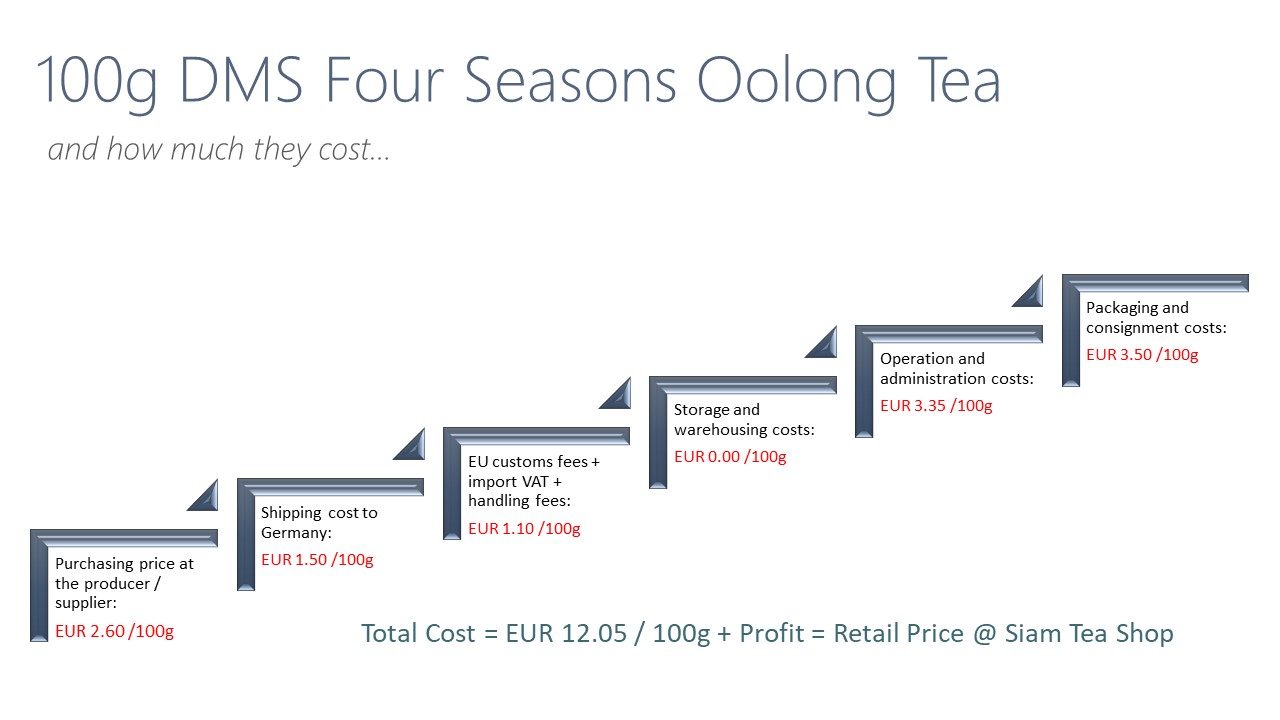 Cost centers and price calculation for DMS Si Ji Chun Four Seasons Oolong Tea @ Siam Tee Shop
Cost centers and price calculation for DMS Si Ji Chun Four Seasons Oolong Tea @ Siam Tee Shop
100g Artisan Yunnan Golden Tips – The Cost
We now want to do the same arithmetic for our Artisan Yunnan Golden Tips from China. Again, we’ll provide amounts originally occurred in another currency (here: renminbi or USD) directly in their respective EUR equivalents.
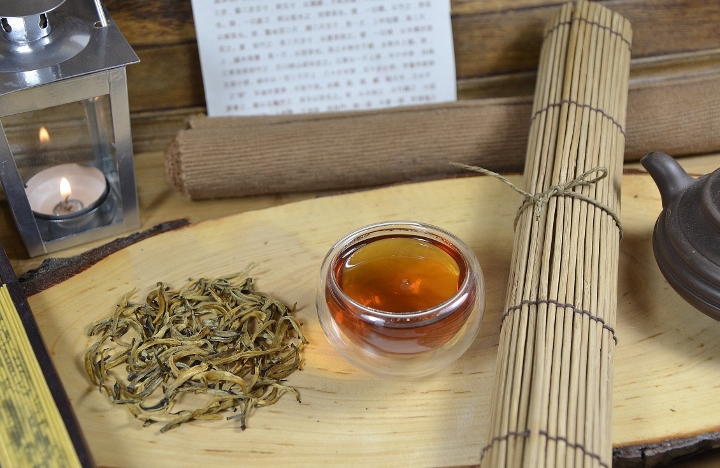 Artisan Yunnan Golden Tips Black tea at Siam Tea Shop
Artisan Yunnan Golden Tips Black tea at Siam Tea Shop
We source this tea from Wild Tea Qi, a wholesaler based in Kunming, Yunnan, specialized in wild and biodiverse cultivated tea. Here, too, I maintain good personal relations with the (US-based) operator and its Chinese partner, Shana Chang. Both are regarded as luminaries in the world of tea, especially in their core area of specialization. And I have learned to appreciate both as of extraordinary integrity.
Purchasing price at the manufacturer / supplier
We buy this tea at a kilo price of ca. 85.00 EUR, according to current exchange rate. This corresponds to a cost of EUR 8.50 / 100g. Upon receipt of the order, our supplier at Kunming, Yunnan, will pack the tea and take it to a local EMS courier service.
Shipping fee to Germany
There, our supplier will send the tea to us by air freight at the price of approx. 25.00 Euro / kg. This is equivalent to EUR 2.50 / 100g pack.
Customs fees + import VAT + handling costs
In the EU, the import of tea is subject to an import VAT of 7% on the purchase price plus shipping charges. To this add customs fees of more than 3% on the same basic amount. So, this is about EUR 1.10 for our 100g pack of Artisan Golden Tips.
Since the Chinese teas come via the Frankfurt airport customs office, I have to pay EMS a “handling fee”, about 35, – Euro. If the customs office decides that they need to open the parcel, which is the case with nearly all our shipments from China, an additional fee of approx. EUR 85.00 is due. If the customs office decides that the consignment must be approved by the State Laboratory, which is for many of our shipments from China, another fee of approx. EUR 75.00 will be charged for that.
In a few cases, the customs office will demand an in-depth examination of the parcel’s content by a private food lab. If this is the case, I have to shell out again EUR 240, -. IN AVERAGE, these processing costs for Chinese teas at Siam Tea Shop add up to EUR 15.00 / kg. Plus, of course, my time … and nerves.
Overall, the share of tariffs, import VAT and handling costs add up to EUR 2.60 for our 100g pack of Artisan Yunnan Golden Tips.
Storage and warehousing costs
Now, the tea is at my home and needs to be stored. Since my private rooms share a house with my rooms for tea storage and consignment – and because this house is my property – there is no storage costs in Siam Tee Shop except for the heating of the packing and consignment space as well as for the cooling of individual teas. Like the Four Seasons Oolong, the Artisan Yunnan Golden Tips doesn’t need any cooling. And the space used for packing is heated together with our living space. Therefore, I assess the storage costs of this tea with 0,00 Euro.
Operating and administrative Costs
This cost position falls out of our temporal-logical sequence. This is because it is about the basic operational costs of Siam Tea Shop, which are accruing independently of our tea’s way into your cup. Nevertheless, without them, there would be no Siam Tea Shop, so they are still an integral part of our cost structure. These include, for example, the cost of maintaining our web presences, as well as our hardware, software and web-based resources. For example, computers, internet, communication, webhosting, webmaster, fees for Microsoft Office, Adobe, and more.
Then, they also include means of operation such as precision scale, printers, paper, cartridges, office supplies of all kinds, etc. Plus, of course, the rooms that I need for the various activities. And the tax consultant, who does the annual accounts for me and Siam Tee Shop. Or, for example, the occasional quality controls of our Thai teas sourced directly from the producer, being done in a specialized private German food laboratory. And there’s more …
In total, these costs for Siam Tea Shop currently add up to approx. 6000, – Euro per year. Since Siam Tee Shop is selling about 180kg of tea each year, we have a cost rate of EUR 3.35 for our 100g bag Artisan Yunnan Golden Tips.
Packaging and shipping costs
First, the cost for tea bags vary depending on their type and size. So, Siam tea shop also uses different bags depending on size and type of tea. In addition, it takes a label sticker for each ordered tea. And a shipping box for each order. And then, there’s the factor work … Often enough, I don’t have the time to take care of packaging and consignment myself. Sometimes, I’m not even available on location, due to travel or other commitments. In any such cases, I have to pay someone for packaging and consignment.
The “factor work” with packaging
A few words more on the factor “work” in this regard: At first, we need to select the correct bag and pick it from the shelve. Then, the container with the corresponding tea needs to be identified and pulled from the shelve. If it’s empty, we must refill it from the main storage. Then, we need to find the adhesive label of the respective tea in a dedicated physical folder, take it off, stick it on the tea bag and label it with the bag’s net weight. Only then, we fill the tea from the large container into the bag, which is placed on a precision scale for that purpose. Now, we select the proper box, fold it and place the tea bag into it, along with other teas of that order, if any, and/or filling material, where needed.
We are not finished yet, as we still have to seal the box with sealing tape. Then, we prepare the invoice for this order on the PC, print it and place it in the box. Or, for shipments to outside the EU, put it in an adhesive bag and stick the same on the outside of the box. As a last step then, we write the order details and customer’s address details on the shipping label. Only now, your order is ready for its way to the post office. And not to forget, we add a free tea sample, for which the same packaging expenditure occurs, to each order!
So, when I add the amount of EUR 3.50 to our 100g-package Artisan Yunnan Golden Tips as packaging costs, this is more than modest. The amount comprises of EUR 1,00 material and EUR 2,50 labor costs.
Total Cost and Profit (100g Artisan Yunnan Golden Tips Black Tea)
If we add all above-mentioned costs of a 100g-pack Artisan Yunnan Golden Tips, we receive total cost of more than 20.00 Euro. To determine my profit, readers might compare this result with the retail price of this tea at Siam Tea Shop… And conclude that the difference amount is hard earned small money.
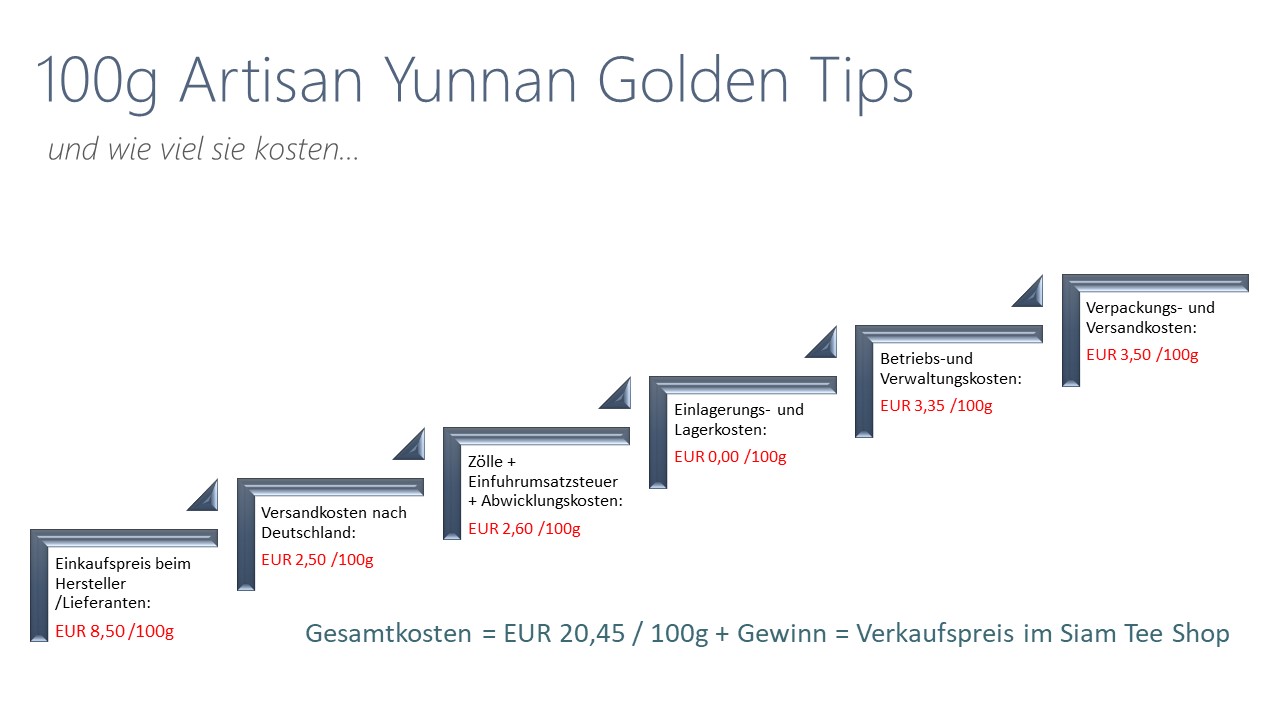 Cost centers and price calculation for Artisan Yunnan Golden Tips @ Siam Tea Shop
Cost centers and price calculation for Artisan Yunnan Golden Tips @ Siam Tea Shop
The cost effect of smaller / larger package sizes on tea prices
As we have seen, the packaging factor is relatively labor- and cost-intensive. Thereby, it has significant effects on tea prices. If the customer orders a 50g or even a 25g pack instead of a 100g pack, all packaging costs of a 100g package will equally occur for the lower amount of tea. The associated cost increase is reflected in the price of the 50g / 25g packs. The higher price of smaller packs in relation to the quantity is therefore not meant as a punishment for customers who want to buy less tea. Rather, it reflects as closely as possible the changed cost structure.
The same applies, of course, also in the positive direction! Therefore, Siam Tea Shop offers many of its teas also as a 200g option. And here, too, the changed cost structure is reflected in a more favorable price relative to the amount of tea.
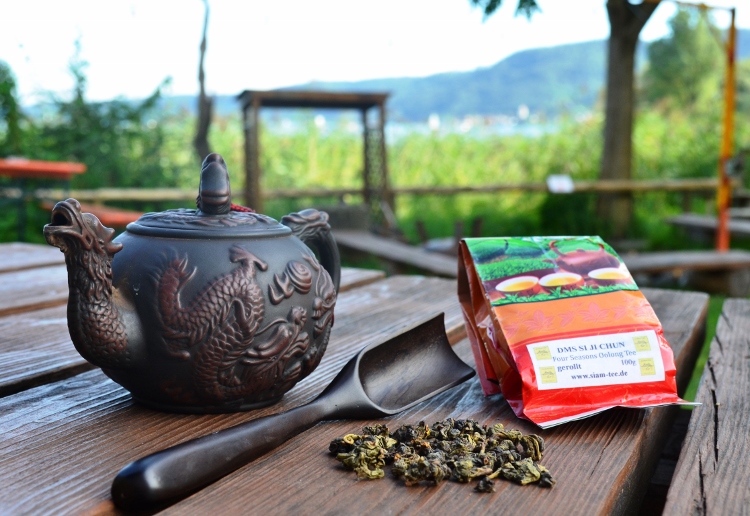 DMS Four Seasons Oolong Tea at Siam Tea Shop
DMS Four Seasons Oolong Tea at Siam Tea Shop
Conclusion
As becomes clear from the above examples, the profits achieved at Siam Tee Shop are rather modest. And our tea prices there accordingly “fair”. Who knows my work, knows how far the same goes beyond maintaining a website and buying and selling tea. For example, I could name my sourcing research, which has always taken unusual and long ways to identify the most special and original ones. Or my social-media activity (Facebook, Google+), which is close to “missionary”. Or my work as a blog article author …
And none of this is part of the above cost centers. So, it might just be alright, if Siam tea Shop makes a few hundred bucks each month for me… And there is still a bit of air left upstream, without me having to experience sleepless nights due to guilty conscience.
Speaking of transparency … the above example calculations show ME that before the end of this year I should re-calculate my Thai and Chinese teas … Therefore, the sympathetic reader might now do their panic buying at Siam Tea Shop, as long as “this guy still gives away his tea”.
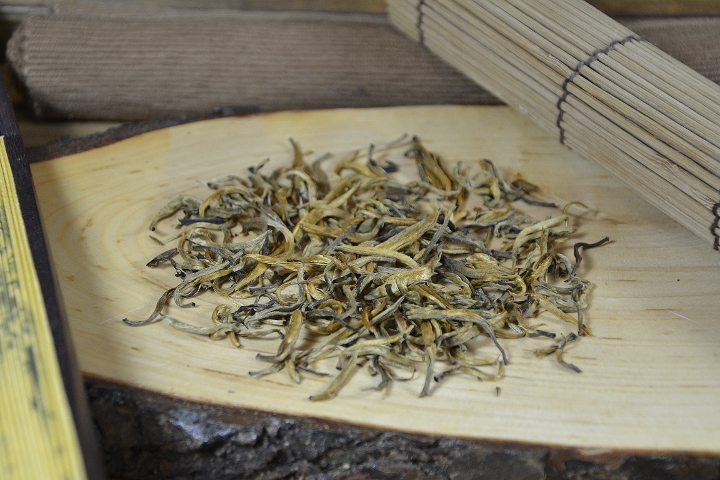 Artisan Yunnan Golden Tips Black tea in the Siam Tea Shop
Artisan Yunnan Golden Tips Black tea in the Siam Tea Shop
By the way, another one of my articles at Siam Tea Blog / SIAM TEABLOID,
The True Value of Tea – A Holistic or ‘Qi’ Approach
explores the topic of “the value of tea” from a more philosophical perspective.

